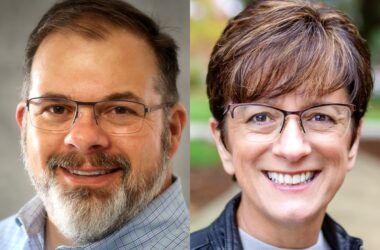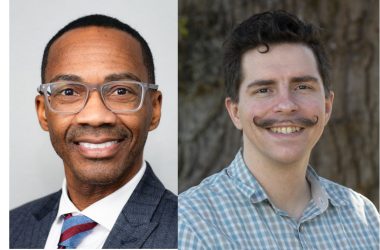In his first Town Hall since becoming a Salem city councilor in 2021, Jose Gonzalez talked about city revenue problems, bias in code enforcement and his priorities for northeast Salem.
The event came a week after voters overwhelmingly rejected the city’s payroll tax and citizens had plenty of questions about what comes next.
The Town Hall was the last in a series hosted in the downtown office of the Democratic Party of Marion County. The Tuesday, Nov. 14, event drew a crowd of under 20, and had a conversational tone as participants made comments and asked precise questions about city policy.
Several attendees had also participated in the first South Salem Town Hall hosted by Councilors Vanessa Nordyke, Linda Nishioka and Deanna Gwyn the week before.
Gonzalez is the councilor for Ward 5 in Northeast Salem, which includes Northeast Portland Road and follows Northeast Kale Street out to Northeast Cordon Road. It includes parts of the Highland, Northgate and North Lancaster neighborhood associations.
He opened the town hall by explaining his upbringing as the son of Mexican immigrants growing up in rural towns north of Salem. He became a real estate agent after seeing a newspaper advertisement over two decades ago, and was later the founding board president of the Latino Business Alliance. He said he ran for city council after learning about the city’s expected population growth, and felt northeast Salem needed stronger representation in city planning.
He shared some of what he considers top successes in his tenure, including opposing a casino that the Confederated Tribes of the Siletz planned to build in northeast Salem. In April, Gov. Tina Kotek informed the tribes she did not support the expansion.
Gonzalez said he was concerned about infrastructure, roads and the potential for criminal activity at the casino and that its location on the I-5 corridor was “prime time real estate” for trafficking.
“The cartels are taking in everybody. They take advantage of the Latino youth. That’s who they take advantage of. So that casino would be a gold mine. I mean it’d be right off the freeway. Everything you can imagine – drug dealing, trafficking, prostitution,” he said.
He said he also was excited to see $925,000 in infrastructure bond funds allocated to add bathrooms at Northgate Park. The park hosts Fun Friday in the summer, a gathering first created by residents who wanted to take back the park’s identity as a neighborhood staple in response to violent incidents. Gonzalez said the park and event get people involved in the community who otherwise don’t show up.
He also said he would like to reform enforcement of city codes governing neighborhood issues like housing code, derelict properties, maintenance and noise complaints. Gonzalez said it’s now based on a complaint-driven system that disproportionately impacts people of color.
“So if someone goes to complain to this neighbor, they’re going to get harassed,” he said.
Residents asked questions about the outcome of the payroll tax, and what would come next. Gonzalez was one of four votes against the payroll tax, when the city council narrowly passed it in July, before it headed to a referendum and was rejected by voters Nov. 7.
Gonzalez said he opposed the tax because he thought it would mostly impact retail workers, and wanted it to go to a vote.
“We’re not in Silicon Valley, we don’t have an overabundance of people that work online. We don’t have high-paying manufacturing jobs,” he said.
Town hall attendees shared their thoughts on alternatives.
An attendee noted that they didn’t believe the city’s operations fee, assessed on utility bills, was equitable, and didn’t charge big companies like Walmart and Costco.
Gonzalez responded that the city wants to make companies pay more proportionally, but the software used by the city can’t handle that task. The software is 25 years old, and the city is looking to upgrade it.
A resident asked about the potential for service fees for buildings that don’t pay property taxes, such as state buildings, that could support police and fire services.
Gonzalez, who is also chair of the city’s finance committee, said that he anticipates the city will now need to find ways to “nickel and dime” funds with a combination of cuts to balance the city budget. The council will next consider cuts and revenue options in a meeting on Nov. 27.
City officials likely will recommend creating a revenue task force in January to explore options to raise money, said spokeswoman Courtney Knox Busch. The city’s budget committee, which includes the city council and nine citizen members, will start considering the five-year budget forecast that month.
Someone else suggested a sales tax, which got some hearty laughs from the room – but not from Gonzalez.
“I’m open, but anything should be run by the voters,” he said. “Really, everything should be run through that lens regardless of if it’s right or wrong. But everybody’s going to have to give a little bit, somehow.”
Attendees also asked about a separate tax levy devoted to emergency services. It was one of the options presented to the budget committee based on recommendations from the 2018 revenue task force.
“There was a consensus that we like that one,” Gonzalez said. “But after that, we never heard about it. Staff was like ‘no you’ve got to do it every five years, and there’s this and there’s compression,’ but we liked it.”
He said that no matter what the city does, there’s now a risk it will be sent to the ballot and voted down.
“I don’t think there’s going to be a right or wrong, it’s just: what can we get done?” he said.
Contact reporter Abbey McDonald: [email protected] or 503-704-0355.
SUPPORT OUR WORK – We depend on subscribers for resources to report on Salem with care and depth, fairness and accuracy. Subscribe today to get our daily newsletters and more. Click I want to subscribe!

Abbey McDonald joined the Salem Reporter in 2022. She previously worked as the business reporter at The Astorian, where she covered labor issues, health care and social services. A University of Oregon grad, she has also reported for the Malheur Enterprise, The News-Review and Willamette Week.









